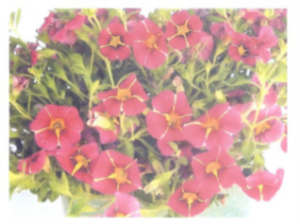Federal Circuit Holds That For Ornamental Plants, Mere Display Counts As “Public Use”
How does one “use” an ornamental object? This question was at issue in the recent case of In re WinGen LLC (Fed. Cir. 2023). In a nonprecedential opinion, the Federal Circuit held that the display of an ornamental plant at a private marketing event constituted invalidating prior public use under pre-AIA 35 U.S.C. § 102(b). The utility patent at issue covers an ornamental Calibrachoa plant dubbed ‘Cherry Star’. The petunia-like plant has a “single half-dominant gene” that results in a star-shaped pattern on the petals, a phenotype not previously seen in wild Calibrachoa species.

Representative claim 1 of the application has both phenotype and genotype limitations:
- A Calibrachoa plant comprising at least one inflorescence with a radially symmetric pattern along the center of the fused petal margins, wherein said pattern extends from the center of the inflorescence and does not fade during the life of the inflorescence, and wherein the Calibrachoa plant comprises a single half-dominant gene, as found in Calibrachoa variety ‘Cherry Star’, representative seed having been deposited under ATCC Accession No. PTA-13363.
During prosecution of the application, the examiner rejected the claims under pre-AIA 35 U.S.C. § 102(b) based upon an alleged prior public use of the plant at a private Home Depot marketing event for wholesale growers. At the event, ‘Cherry Star’ was on display, but attendees were not permitted to take cuttings, seeds, or tissue samples. However, attendees were provided with a leaflet to take home that included a photograph of ‘Cherry Star’, a brief description, and the varietal name. The examiner alleged that although no plants were sold at the event, the activity constituted commercial exploitation, and therefore public use.
On appeal, the applicants argued that not all of the claimed features were made available to the public at the event. Namely, the applicants argued that attendees would not have been aware that the unique petals of ‘Cherry Star’ resulted from the claimed single half-dominant gene. However, because the applicants did not raise this argument in front of the PTAB, the Federal Circuit did not consider it. The Federal Circuit focused their inquiry solely on whether there was a “public use” of ‘Cherry Star’.
Determining what constitutes public “use” of an ornamental object is no easy task, and prior to In re WinGen, the Federal Circuit had never before decided this issue. In determining whether the mere display of ‘Cherry Star’ was a public use, the Federal Circuit first considered their only other prior public use of a plant case, Delano Farms Co. v. Cal. Table Grape Comm’n, 778 F.3d 1243 (Fed. Cir. 2015). However, the facts of Delano Farms were markedly different and involved the unauthorized use of a patented grape variety. In Delano Farms, the claimed grape was grown in locations visible from public roads but were not labeled in any way and anyone viewing the grapes would have no way of recognizing the grape as the claimed variety. This is unlike ‘Cherry Star’, which was clearly labeled at the Home Depot event.
The Federal Circuit found the case of Motionless Keyboard Co. v. Microsoft Corp., 486 F.3d 1376 (Fed. Cir. 2007) to be relevant. In Motionless Keyboard, the Federal Circuit held that mere display of a keyboard was not a prior public use because the keyboard was not connected to a computer and was never used to transmit data. However, unlike a keyboard, the only use of ‘Cherry Star’ is for display as an ornamental plant. Thus, displaying ‘Cherry Star’ at the Home Depot event was a use of the plant for its intended purpose and constituted invalidating prior public use.
It is unclear whether the result would have been different had the applicants been afforded the opportunity to argue specifics of the claim language. Nonetheless, the case of In re WinGen should serve as a cautionary tale to plant breeders and patent practitioners alike: consider patent filings before public disclosures or commercial activity.
Melissa Mitchell is an intellectual property attorney in the MVS Biotechnology and Chemical Practice Group. To learn more, visit our MVS website, or contact Melissa directly via email.
← Return to Filewrapper